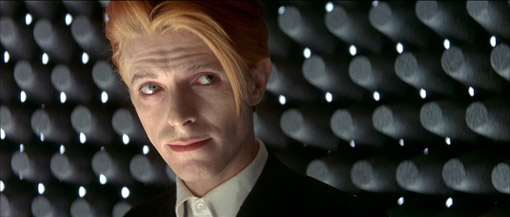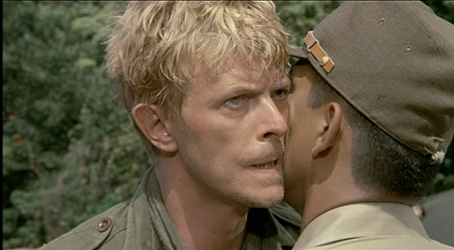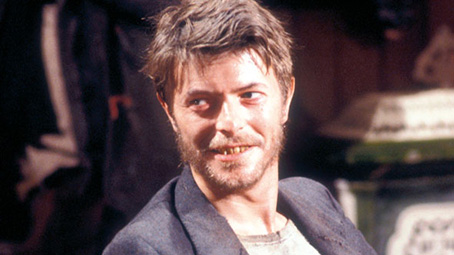| Bowie – Too Soon: a short appreciation of a great talent, by Camus |
|
Bowie stayed a hero to many for a lot longer than '...just for one day'. His death at 69 after battling cancer is something of a sad shock. The music world has lost an enduring icon of popular art, writing lyrics that were poetry by any other name and music that was nothing if not pushing at areas unexplored by most. Bowie became a genre of one, the surging current between the cracks of mainstream popular music and as a child and teenager during his most active years, I didn't 'get' him musically except for the crowd pleasers which we absorbed in the 70s like sun tan cream (which we never needed of course in the UK). It was two Bowie moments that made me aware of his singular talent. The first was subtle and the second stunned me into an appreciation that was late but as heartfelt as any fan. Even though the line "Planet Earth is blue and there's nothing I can do," seems simple and straightforward, to an emerging existentialist (hey, cut me some slack, I was a teenager) this was profound genius. Forget how often it's been quoted or paraphrased. The line is undeniably the thin crust of a whole pie of meaning. The space race was still in the news at the time and the famous photo of the Earth (aka 'Earthrise') taken in December 1968 by Apollo astronauts from the moon's orbit obviously inspired the line written in 1969. The line's simplicity ticks one of Steve Job's boxes, his famous quote being "You have to work hard to get your thinking clean to make it simple. But it's worth it in the end because once you get there, you can move mountains." Or maybe there's nothing you can do...

In terms of cinema, the late and undeniably great David Bowie wasn't prolific but apart from a few shorts and an uncredited role in Virgin Soldiers, Bowie's real screen acting debut was a startling and eye-popping performance as an alien on Earth looking to transport water to his home planet by using alien tech to make billions to fund the venture. I've reviewed The Man Who Fell To Earth, directed by Nic Roeg, so will not revisit or repeat myself but you could do a lot worse than remember the legend through his performance in this one film alone. The other Bowie stand out performance for me personally was his Jack 'Strafer' Celliers in Merry Christmas Mr. Lawrence. I'll leave you with an all too ironic quote from that film's director Nagisa Oshima. He saw Bowie's stage performance of The Elephant Man and said that he cast him because he had "an inner spirit that was indestructible." Ah, that we wish this was true. Maybe it is. R.I.P. David Bowie.
| Cracked Actor: some personal favourites from Bowie's film work, by Slarek |
|
When I paid tribute to the late, great Wes Craven back in August of last year, I noted that one of the things that hit me about his death was that I somehow never imagined he would actually die, at least not while I was still sucking air. What went for Craven goes double for David Bowie, the eternally young rock star, producer, musical innovator and occasional actor whom I seem to remember a slightly cynical NME journalist once claiming was "the nearest thing to a genius we've got." Like so many who have paid tribute to him and his body of work on the day his passing was announced to the world, my formative years were shaped in part by his music, much of which I was introduced to by a close friend that I lost a good many years ago now. Unlike me, he saw Bowie perform on stage and always claimed he was the best live act he ever saw, and the two us attended three Clash concerts together.
Unsurprisingly, it's Bowie's movie work that has been the focus for tributes on movie themed sites and that seems only right. There are many other people better qualified out there to talk about the influence, invention and brilliance of his music, but given that he has a staggering 452 soundtrack credits on IMDb, it's nigh-on impossible to talk about his movies without at the very least touching on the use of his music.

The whole issue of singers carving second careers as actors is often regarded as a thorny one, particularly by those who have made acting their profession and worked their butts off to get where they are, only to have a plum role handed to someone with little or no acting experience, seemingly on the back of their fame in a different medium. Is this a rock star thing or has it always been with us? I mean, were 'legitimate' actors up in arms at the casting of Bing Crosby and Dean Martin back in the day? (Notice how I carefully sidestepped any talk about Frank Sinatra – oops.) If I'm being honest, I can't think of many rock stars turned actors who have a fraction of the range of a half-decent thespian, and handing one the lead role in almost any movie thus tends to look like stunt casting by default. After all, if you're looking to sell a film to as big an audience as you can then having the face and name of a big musical star of the day on the poster will certainly do it no harm. Or so the thinking goes – there's probably a whole article, complete with painful examples, on why this is in no way guaranteed. But sometimes those casting decisions have deeper thought behind them and pay unexpected dividends for the films in question. Which brings me neatly to South London boy David Robert Jones, aka David Bowie.
Bowie's first major feature film role, that of visiting alien Thomas Newton in The Man Who Fell to Earth, helps to make my point. Its director, Nicolas Roeg, was not exactly known for his commercialism, and you can bet that a lot of thought went into that casting decision. And as far as we're concerned, it was absolutely spot on. I'll quote, if I may, from my colleague Camus's review of the film, which captures our shared viewpoint perfectly:
"It's a truism in the business that if you cast right, that's half the movie completed. Bowie is a revelation. His stark, angular features, the irregularity of his pupil size, flaming red hair, slight body and cut glass British accent mark him out as alien almost immediately especially in the Midwest where he lands."
"Going up in a lift renders him unconscious and Bowie plays Newton's fragility and poise like he's been acting for years."
He's so convincing in the later stages when his character falls victim to earthly vices that some have suggested a strongly autobiographical element. It's acting, guys. And he did it well here. And Bowie had a distinctive look that really worked for the film. When I first saw it in my impressionable teens, I was struck by the fact that all it took to make him appear extra-terrestrial was to shave his head and give him green contact lenses.
Casting my eye back over Bowie's film and TV career, particularly the roles that made a specific impression on me, I was immediately struck by the fact that he worked with so many interesting filmmakers. Nicolas Roeg was a great place to start, but he also played roles for Alan Clarke, Tony Scott, Oshima Nagisa, John Landis, Martin Scorsese, David Lynch, Julian Schnabel and Christopher Nolan. How many of these guys do you think cast Bowie because they thought it might boost their box-office returns?

It was Alan Clarke's TV adaptation of Bertolt Brecht's Baal that confirmed for me that Bowie could carry a film or TV play if he had the right director. It remains a criminal shame that so much of Clarke's extraordinary TV oeuvre is so damned hard to find, and this is no exception – Bowie was impeccably cast here and it remains one of the most arresting screen adaptations of Brecht that I've seen.
His role as lonely vampire alongside an equally iconic Catherine Deneuve in Tony Scott's The Hunger was followed by what for me was his finest film role of all as Major Jack Celliers in Oshima Nagisa's extraordinary prisoner-of-war drama Merry Christmas Mr. Lawrence. On the film's release the charges of stunt casting were once again flying and given further credence by having Celliers' opposite number, Captain Yonoi, played by Sakamoto Ryûichi, the film's composer and a rock star of some note himself in Japan. But Oshima's thinking was that Celliers needed to be played by someone iconic enough for us to accept and understand the fascination that Yonoi has for the man from the second he first lays eyes on him. And while there are a few uncertain moments in Bowie's performance (the early sequence in which he mimes washing and shaving feels very 'performed'), there are so many others in which he's so convincing that I just can't imagine the role being played by anyone else. If you're looking for evidence and have a copy of the film then check out the look on Bowie's face as he kisses Yonoi in a move that is designed to save the lives of his men but that seals his own fate. I get a shudder just thinking about it.
One of my favourite smaller Bowie roles is one that I rarely see discussed, that of smiling and disconcertingly playful hit man Colin Morris in John Landis's underrated Into the Night. His first encounter with Jeff Goldblum's hapless insomniac, whom he has mistaken for a criminal of some standing, is a low-key hoot that has me chuckling every time I think about it. His starring role in Jim Henson's cult fantasy Labyrinth remains one of his most popular and for many is the film for which he will be best remembered. But it's his smaller roles of the 80s and 90s that I enjoyed the most, my favourites being his low-key turn as a quietly intimidating Pontius Pilate in Martin Scorsese's The Last Temptation of Christ, and his offbeat cameo as thought lost FBI Agent Phillip Jeffries in Twin Peaks: Fire Walk With Me, one of several name actors who took roles for next to no money because they were such fans of the original series. In 1996 he got to play one of his own major inspirations when he was cast by Julian Schnabel as Andy Warhol in Basquiat, and in 2006 he gave one of his best performances as scientist Nikola Tesla in Christopher Nolan's The Prestige. There are a fair few others I've not mentioned here. Feel free to add your own personal favourites.
But while his work in front of the camera has had its noteworthy moments, his music has also made its mark on cinema and proved inspirational for a number of notable directors: the slow, handheld drift around a dead man's flat to the seductive strain of Heroes in Chris Petit's Radio On; the songs that are so important to the title character in Uli Edel's Christiane F.; the theme song to Paul Schrader's classy remake of Cat People; Denis Levant's kinetic, exhilarating run down the street to Modern Love in Leos Carax's Mauvais sang; the hypnotic, haunting use made of I'm Deranged at the end of David Lynch's Lost Highway; the sublime match-to-scene of Under Pressure in the musically rich Grosse Point Blank; the politically charged use of Young Americans in Lars von Trier's Dogville... I could go on and on. A little ironically, one of my very favourite uses of Bowie's music is in Wes Anderson's wonderfully quirky The Life Aquatic with Steve Zissou, a film in which his songs have been translated into Portuguese and sung by cast member Seu Jorge, with just a single acoustic guitar for accompaniment. The payoff comes at the very end, with Jorge's rendition of Queen Bitch dissolving into Bowie's own as the cast march together in a tribute to the glorious end credits sequence of The Adventures of Buckaroo Banzai Across the 8th Dimension.
It's a well worn cliché, sure, but in this case it's oh so true – we may have lost the man but the legend lives on, in his film performances, in his still inspirational songs, and in the soundtracks of films that have yet to be made that his music will doubtless continue to grace.
|